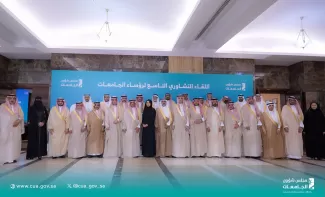The University Affairs Council issues a series of development decisions to enhance the organizational efficiency of universities and improve academic and administrative performance in the Kingdom's university education system.-draft
The Council of University Affairs, chaired by His Excellency the Minister of Education, Dr. Hamad bin Mohammed Al Al-Sheikh, issued a number of development decisions for universities to keep pace with future aspirations and meet national needs. These decisions aim to enhance the efficiency of the outcomes and performance of the Kingdom's university education system, in line with global best practices for university institutions.
The Council of University Affairs' decisions included doubling admissions to the 2020 level in specialized colleges (health, engineering, technology, applied sciences, and business administration), based on the colleges' capacity. This will improve educational outcomes and contribute to meeting labor market needs. The Council also decided to reduce admissions by at least 50% in majors that are not aligned with the labor market, while increasing the intake of male and female students in specialized colleges. This decision will be effective for five years, and its implementation will be evaluated after three years. The Supervisory Committee, chaired by His Excellency the Vice President for Universities, Research, and Innovation, will monitor its implementation.
The Council of University Affairs also issued a decision to expand the application of professional and vocational certificates in all disciplines. To raise the skill level of university students, which will be reflected in their professional, more efficient, and effective preparation for the labor market, and enhance the competitiveness of students locally and globally, each university will add indicators for professional and vocational certifications to its annual report.
In addition, the decisions issued by the University Affairs Council require universities to measure the employment rate of their graduates in each specialization, as well as the percentage of graduates employed part-time and full-time, the percentage of graduates employed in their field of study, and the average basic and total monthly salary for employed graduates. These will be included in the semi-annual report and published on the university website. This indicates the importance of competition among universities to align their academic programs with the requirements and needs of the local and international labor market.







